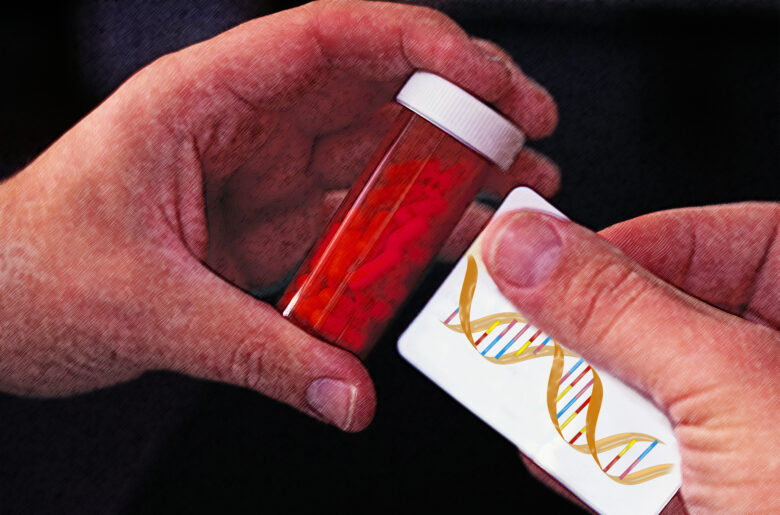Personalized medicine is an important advance in healthcare because it aims to tailor healthcare to the unique needs of each person. Genetic information is a key part of this approach because it provides doctors with a wealth of information about how patients will respond to treatment, the risks they face, and the best ways to prevent them from getting sick. Genetics, the study of genes and how they work, is a key component of personalized healthcare, which means moving away from a “one-size-fits-all” model and toward a more personalized approach that takes into account each person’s unique genetic makeup.
1. How Genes Play a Role in Personalized Medicine
Genetics provides us with detailed information about each person’s genetic code, which is the foundation for personalized medicine. The information in a person’s DNA about their likelihood of developing disease, how their body breaks down medications, and their overall health risks are enormous. Healthcare professionals can learn more about a patient’s unique health status by looking at this genetic information.
For example, genetic testing can detect certain mutations or changes in genes that make people more susceptible to certain diseases. With this information, we can detect and treat problems early, which can prevent the condition from getting worse before it gets worse. Genetic information can also help doctors choose treatments that are more likely to be effective, based on each patient’s genetic makeup.
2. Tailoring Treatments to People’s Genes
One of the biggest benefits of genetics in personalized medicine is that it allows doctors to tailor treatments to each person’s genes. Often, traditional treatments are based on broad principles and may not take into account that people respond differently to medications. Genetics makes it easier for us to guess how someone will respond to certain treatments, which means we can come up with better, safer options.
Pharmacogenomics is a field of personalized medicine that studies how a person’s genes affect their response to medications. Because of this field, medications have been developed that target specific genetic profiles. This reduces the risk of side effects and improves the effectiveness of the treatment. For example, some genetic differences can affect how quickly a person breaks down a medication, changing its effectiveness and safety. Understanding these genetic factors can help doctors change dosages or choose different treatments that better fit each patient’s genetic profile.
3. Learn How to Prevent and Treat Diseases
Genetics is also important in predicting and preventing disease. Genetic testing can identify people who are at higher risk of developing certain diseases, such as cancer or heart disease. Armed with this information, people can take proactive steps to reduce their risk, such as more frequent checkups, lifestyle changes, or preventive treatment.
For example, people with mutations in the BRCA1 or BRCA2 genes are more likely to develop breast or ovarian cancer. Knowing this can help early screening, cancer-preventive surgery, and other measures to significantly reduce the risk of developing these diseases. Similarly, genetic testing for inherited conditions such as familial hypercholesterolemia can help detect and treat these conditions early, preventing the development of heart disease.
4. Improve Diagnostic Accuracy
Genetics helps doctors make better diagnoses by giving them more detailed information about a patient’s disease. Traditional diagnostic methods can rely on symptoms and general tests, which can sometimes lead to an incorrect or delayed diagnosis. Genetic testing is a more accurate method of looking for specific genetic mutations or changes associated with certain diseases.
For example, genetic testing can help detect rare or complex genetic conditions that may not be easily detected by other testing methods. This can help doctors make more accurate diagnoses, leading to more effective treatments and better condition management. Genetic information can also help distinguish differences between similar conditions, allowing for more accurate and effective treatment plans.
5. Improve R&D
As genetics is used for personalized medicine, research, and development are also advancing. Genetic research helps us understand the core mechanisms of disease and discover new drug targets and treatment options. By understanding how diseases are caused by genes, researchers can develop more effective treatments and interventions that target specific genetic profiles. Finally, genetic information can help create new diagnostic tools and technologies.
6. Challenges and Considerations
Genetics has many advantages for personalized medicine, but it also raises some questions and things to think about. Performing genetic tests and figuring out what the results mean requires a lot of expertise and skill. These tests may not work for everyone. Genetic information also raises ethical and privacy issues, such as consent issues, data security, and the potential for discrimination.
It is important to ensure that genetic information is used responsibly and that patients fully understand what genetic testing means for them. Healthcare professionals must address these issues while also leveraging genetics in personalized medicine.
Conclusion
Genetics is an important part of personalized medicine because it helps physicians make better diagnoses, tailor treatments, and predict and stop diseases before they occur. We can take a more personalized approach by using genetic information in healthcare to account for each person’s unique genetic characteristics. This personalized strategy not only makes treatment and prevention more effective, but also accelerates research and development. To fully realize the benefits of personalized healthcare, we must address issues and ensure that genetic information is used responsibly while continuing to explore its potential in medicine.
FAQs
1. What is personalized medicine? How does genetics fit into it?
In healthcare, personalized medicine means ensuring that each patient receives care that is specifically designed for them. Genes are important because they provide a wealth of information, including how a person responds to different treatments, how likely they are to develop certain diseases, and how best to protect them from those diseases. By taking into account each patient’s unique genetic profile, this personalized approach aims to make treatments more effective and understand their side effects.
2. How can genetic information help doctors provide more effective treatments for everyone?
Figuring out how a person’s genes affect their response to medications is one way that genetic information can help develop treatment options. Pharmacogenomics is a form of personalized medicine that studies these genetic differences to understand how different people process medications. Healthcare professionals can then choose the best drug and dose for each patient, reducing the risk of side effects and increasing the likelihood of a good outcome.
3. What are the benefits of using genetics to predict and prevent disease?
By using genetics to predict and prevent disease, doctors can identify people at an early stage who are more likely to develop certain diseases. This early detection can help people take preventive measures, such as increased monitoring, lifestyle changes, and treatment. For example, finding genetic markers that are associated with a higher risk of cancer could lead to earlier screening and preventive measures, which would reduce the number and severity of the disease.
4. How can genetics improve the accuracy of medical diagnoses?
Genetics helps doctors make more accurate diagnoses by giving them specific information about genetic changes or mutations that are linked to different diseases. This could help doctors make more accurate diagnoses, especially for rare or complex conditions where old methods have been difficult to find. Accurate genetic testing can help distinguish differences between similar conditions, allowing for more targeted and effective treatment plans.
5. How can genetic research help personalize medicine?
Genetic research helps personalize medicine in many ways. It could help identify new drug targets and develop treatments that work best for people with certain genetic traits. As genetic testing and sequencing technologies continue to advance, we can discover genetic differences and learn more about how they affect health. This ongoing research is leading to new diagnostic tools and treatment options that could make personalized healthcare strategies work better.




